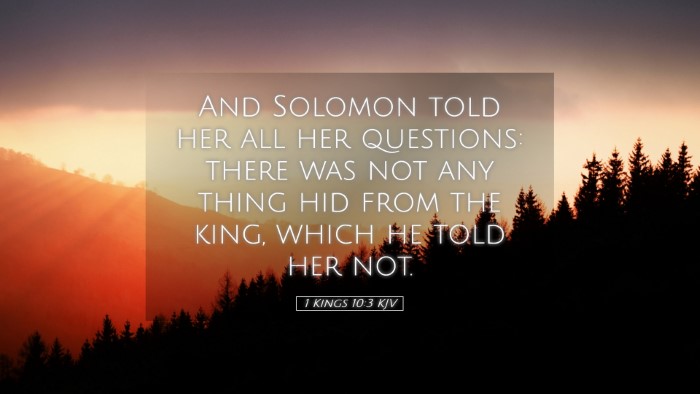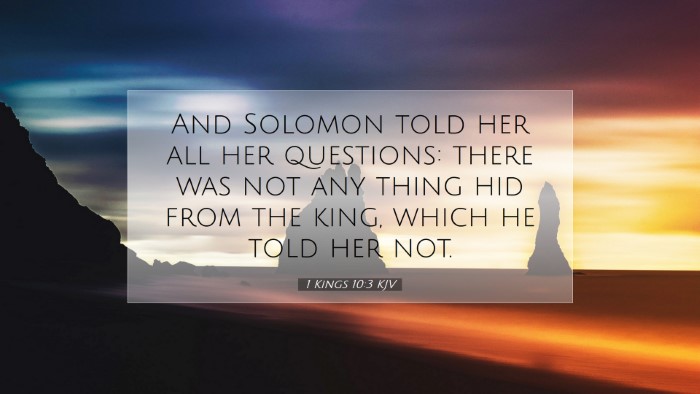Commentary on 1 Kings 10:3
1 Kings 10:3: "And Solomon told her all her questions: and there was not any thing hid from the king, which he told her not."
Introduction
This verse marks a significant moment in the interaction between Solomon, the wisest of kings, and the Queen of Sheba, who came to test Solomon with hard questions. It showcases Solomon’s exceptional wisdom and discernment, and serves as a demonstration of God's favor upon him. The insights gleaned from various public domain commentaries highlight the spiritual, theological, and practical implications of this encounter.
Historical Context
The narrative of 1 Kings 10 provides a critical look into the reign of Solomon, focusing on his military prowess, wealth, and exemplary wisdom. The visit from the Queen of Sheba illustrates the global recognition of Solomon's wisdom and assists in defining his legacy. According to Albert Barnes, this visit symbolized an acknowledgment of God’s blessing upon Israel during Solomon's reign.
Insights from Commentators
-
Matthew Henry:
Henry emphasizes the humility and eagerness of the Queen of Sheba in seeking wisdom. He identifies her visit as not merely a quest for knowledge but as a spiritual pilgrimage. The journey she undertakes is indicative of a heart that yearns for truth and understanding, recognizing that the wisdom displayed by Solomon is divinely bestowed. In telling her all her questions, Henry notes that Solomon exemplifies the generous sharing of knowledge that is expected of a wise ruler.
-
Albert Barnes:
Barnes provides a detailed exposition on the nature of the questions posed by the Queen, suggesting they were not only intellectual inquiries but also moral and ethical dilemmas that required profound discernment. He takes note of the phrase “not any thing hid from the king,” signifying that God’s wisdom with Solomon enabled him to unveil hidden truths, thus proving that true wisdom is comprehensive and insightful.
-
Adam Clarke:
Clarke elaborates on the spiritual implications of the queen's quest for wisdom. He notes that her acknowledgment of Solomon's wisdom was a recognition of the God of Israel who endowed Solomon with such qualities. Clarke stresses that the answers Solomon gave were not merely facts but revelations that connected to deeper truths and divine principles, reflecting the importance of divine wisdom in governance and leadership.
Theological Implications
1 Kings 10:3 serves as a reminder of God's sovereignty in bestowing wisdom upon whom He chooses. It raises several theological considerations:
-
The Nature of Divine Wisdom:
The wisdom Solomon possessed is portrayed as a gift from God, affirming the belief that all wisdom ultimately originates from the divine. This notion echoes throughout Scripture, illustrating the continuous need for reliance on God's wisdom in making decisions.
-
Wisdom and Leadership:
The relationship between wisdom and effective leadership is highlighted in this verse. Solomon's ability to answer all questions posed by the queen symbolizes an ideal of governance where wisdom prevails over foolishness. Pastors and leaders should aim to seek divine wisdom for guidance and decision-making.
-
Universal Recognition of God’s Power:
The visit of the Queen of Sheba signifies that the knowledge of God and His sovereignty transcends geographical and cultural boundaries. It suggests a universal quest for truth that transcends nations and peoples, pointing towards a future where all will acknowledge the Lord.
Practical Applications
The lessons extracted from 1 Kings 10:3 are vital not only for biblical scholars and theologians but also for everyday believers:
-
Seek Knowledge Earnestly:
Like the Queen of Sheba, believers are encouraged to pursue knowledge and understanding earnestly. This pursuit reflects a heart that longs for deeper truth and God's revelation in their lives.
-
Share Wisdom Generously:
Solomon's readiness to share his wisdom serves as an example for pastors and teachers to impart knowledge generously, fostering a culture of learning and growth within their communities.
-
Acknowledge God’s Sovereignty:
Understanding that ultimate wisdom belongs to God encourages believers to humbly rely on Him in times of confusion and decision-making, reinforcing the necessity of prayer and supplication for divine guidance.
Conclusion
1 Kings 10:3 encapsulates a pivotal moment of revelation through the dialogue between Solomon and the Queen of Sheba, offering rich insights into wisdom, leadership, and the nature of divine knowledge. Engaging with commentaries from Matthew Henry, Albert Barnes, and Adam Clarke provides us with layered perspectives to understand the theological and practical implications of this text. This passage ultimately calls us to seek wisdom, share it freely, and acknowledge the source from which it comes—God Himself.


